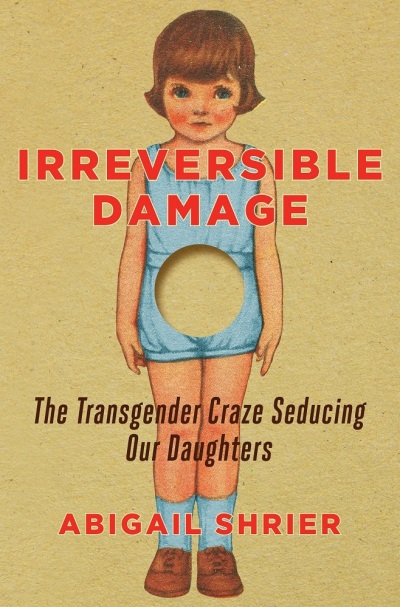Our girls are being irreversibly damaged by the transgender craze: book review

Although it has never been easy, the fear of entering womanhood is so excruciatingly painful for some girls they want to escape it entirely. And many are desperately trying by adopting a new persona.
Today, they are being seduced by a social contagion that comes with experimental medicalization that promises them liberation, uniqueness, a new identity, and a fresh start on life. What they're getting, however, is grave harm to their psyches, and their bodies are being destroyed. Worst of all, the damage is irreversible.
Reading journalist Abigail Shrier's much-anticipated book, Irreversible Damage: The Transgender Craze Seducing Our Daughters, was unlike reading any other book in that it felt more familiar than anything I'd ever read because I've been swimming in this particular sea for some time now. I've been reporting at The Christian Post on the gender identity movement and all of its implications for almost four years. In the interest of full disclosure, Shrier lists my name and those of many others who've been reporting, researching, and educating the public on this topic in the acknowledgments section of her book.
I found myself underlining a few passages and saying to myself, "Ah, yes, I remember writing about that," as Shrier deftly articulated how transgenderism has pervaded every realm of culture. As I can easily attest, any public skepticism of the ideology, even when framed with the utmost graciousness, is met with ferocious pushback.
This was especially the case with the scholarship of Dr. Lisa Littman, an OB-GYN turned public health researcher and Brown University professor, which Shrier explains at length in Chapter 2 of her book.
In 2018, Littman published a peer-reviewed article in PLoS One, an academic journal, exploring the phenomenon known as rapid-onset gender dysphoria (ROGD). Her findings showed that 65% of young girls who had self-identified as transgender during their adolescence did so after being immersed in social media for extended periods of time. In other words, the steep increase in the number of young girls identifying as the opposite sex was not an organic development, but a shockingly sudden, internet-fueled peer contagion.
Predictably, transgender activists reacted with rage and excoriated the study, claiming without evidence that Littman's methodology was shoddy. Brown University was pressured into issuing an apology. PLoS One's editor-in-chief also apologized in an unprecedented move. One infamous gender psychologist went so far as to compare Littman's use of surveys of parents of ROGD kids in her research to "recruiting from Klan or alt-right sites to demonstrate that blacks really were an inferior race."
In March 2019, PLoS One published a "correction" of Littman's original article, but her findings were unchanged.
Shrier told this CP reporter in a phone interview last week that her original book pitch was more along the lines of a feminist update about how young women are doing amid a significant mental health crisis in society. But that idea morphed into a book on the transgender contagion and its disproportionate impact on teen girls after Shrier wrote an article about the topic and heard from a reader about her adolescent daughter's heartbreaking experiences.

Shrier skillfully navigates the many dimensions of the transgender movement, bringing thoughtful analysis where it has been sorely lacking in the mainstream press. With remarkable precision, she documents how public school systems have forsaken basic science and gone full-bore into indoctrinating (and confusing) the rising generation with all things gender. The author also engages popular trans-identifying YouTubers and social media stars and explores their outsized influence on impressionable teen minds.
She also gives a powerful voice to suffering parents who continue to struggle over how to relate to their trans-identifying children, some of whom have cut all ties with family for not supporting their new identities. Chapter 10, "The Regret," highlights courageous detransitioners, those who gender-transitioned, wound up desisting, and are now reintegrating with their birth sex. Such detransitioners are growing in number and are starting to be heard more despite a near-total mainstream media blackout.
Most importantly, in my view, she critically examines what is known as "gender-affirmative" care — a relatively recent approach within the world of modern psychiatry and medicine in which supposed professionals rush to affirm youth as transgender if they self-diagnose as the opposite sex. Proponents of this model steer gender-atypical young people, many of whom are on the autism spectrum, down a pathway of hormonal and surgical transition.
Yet why do so many girls want to opt-out of being women? Why are they now willing to take such drastic steps like ingesting untested hormonal agents and undergoing surgeries in order to appear more male, despite permanent side effects such as sterility and increased risk of disease?
I do not like saying this, but one reason is that the contemporary West, the United States included, is saturated with extremely violent pornography.
"I don't think people realize just how bad it is," Shrier told me. "They think pornography might be a Playboy picture of a woman, but the choking, the violence to women that is accessible to young children is really harmful to young women."
When girls grow up in a society where many men and boys are hooked on raunchy, abusive smut, which is now only a few clicks away, it is not hard to understand why some girls internalize the message that women are nothing more than disposable objects to be used for male sexual gratification. Who wouldn't want to escape that?
Yet what most moved me in Shrier's book was her vulnerability that emerged in a number of poignant moments. Although she's armed with degrees from Columbia, Oxford, and Yale Law School, her writing is not a heady, dry treatment of a touchy topic. Irreversible Damage strikes the right balance, sprinkling in a few relevant personal anecdotes alongside heavy subject matter that far too few U.S. journalists have been willing to scrutinize.
Shrier recounts how, like most teenaged girls, she personally experienced discomfort with her appearance, to the point where she actively considered undergoing a breast reduction. Her mother was not thrilled with the idea, but it was her father who emphatically refused to even entertain it, and then boldly affirmed Shrier as a young woman, telling her that there was nothing wrong with her body.
"Unfortunately, we've so denigrated fathers. And they don't always know that they have such an important role to play in their daughters' lives and making their daughters feel like they are normal," Shrier said in our interview.
"Because girls will go through a period where they all feel ugly, where they all feel undesirable and unwanted. And having a father who affirms for them that they are attractive, that they are lovable exactly as they are, is a really powerful thing in a young girl's life."
Indeed, many men have no clue how females often feel in relation to their own bodies. For many women and girls, it borders on an existential struggle. But it does not and should not have to be this way, Shrier maintained, as womanhood is full of wondrous joys and blessings.
What many have also not yet realized, and it shocked and horrified me when I first learned this a few years ago, is that the transgender movement is exploiting those within the LGBT.
Nowadays, youth who are same-sex attracted, some of whom have not even identified themselves as among the LGB yet, are being told during their doctor's appointments and in therapist offices that their attractions might indicate that they were actually "born in the wrong body" and that they might really be transgender. That will likely entail additional "gender-affirmative" therapy, a referral to a trans counselor, experimental hormone treatment, and possibly surgeries.
Let me just say here that it is without reservation or hesitation that I, a small-o orthodox Christian who enthusiastically believes in my faith's historic teaching on sexual ethics and marriage, consider such clinical and therapeutic practices to be unconscionable. To any such Christian reading, I implore you, please speak out against this. Whatever you think theologically, same-sex attraction is most definitely not a biological disease to be remedied with hormone injections and surgical procedures. I know it's bewildering, but in many contexts that is how it is now being treated. Some of these stories have landed in my inbox, pleading with me for help.
"We're euthanizing a generation of young lesbians," Shrier said soberly when I asked her about what she'd seen on this front.
"We are eradicating a generation of young lesbians by turning them into boys and telling them they are really boys," she reiterated. "But we're also making girlhood so narrow, and femininity so narrow today. It's so sad. We've taken all the tomboys and all the different ways girls could express themselves and we've told them: 'No, those are all gender-nonconforming.' That's not true. It didn't use to be such a confining place."
Given the effects of puberty blockers and testosterone on the female body, American society is presently setting up a generation of girls for infertility, the author said near the conclusion of our interview, "so we are literally destroying our future."
Shrier has faced fierce pushback from transgender activists and their allies over the book, including a concerted effort to get her publisher to drop her. Podcasters and media outlets have told her they would like to have her on their programs but they say they can't for fear of backlash. But the backlash is coming from mostly male trans activists.
Online retail giant Amazon even disallowed her publisher from purchasing ads to promote the book. The retailer apparently has no qualms taking ad dollars to sell compression binders many trans-identifying girls now wear to flatten their breasts. Wearing breast binders can cause damage to the body, such as cracked ribs and breast deformities.
"I took on this issue because I think it gets really to the heart of what's hurting America today. If we're allowing woke culture to stop us from protecting young girls, who literally carry our future with them, then that is a culture bent on self-destruction," Shrier said.
"They are our future, these girls. If we don't safeguard them and give them a promising future, we have no future."
Nearly 40 years ago, feminist author Andrea Dworkin wrote: "In a woman-hating culture, it is particularly difficult to make credible the claim that a crime committed against a woman must matter."
While Dworkin was speaking about the pornography scourge in a 1981 book on the subject, porn's horrific and ongoing assault on women was and is criminal enough. But what is being done now under the transgender regime, which is mostly funded and institutionalized by exceedingly wealthy men, is nothing short of a systemic, depraved atrocity. Women and girls are, yet again, bearing its cruelest brunt.
It's high time for this madness to stop. It's also time for us all to fight to get our girls back. And bravo to Abigail Shrier for a brave and compelling book.



























